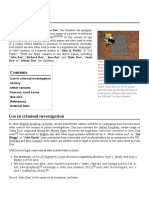Back To Top
Uploaded by
liezle marie almadenBack To Top
Uploaded by
liezle marie almadenBack to Top
Introduction
Monism is the metaphysical and theological view that all is one, that there are no fundamental
divisions, and that a unified set of laws underlie all of nature. The universe, at the deepest level of
analysis, is then one thing or composed of one fundamental kind of stuff. It sets itself in contrast to
Dualism, which holds that ultimately there are two kinds of substance, and from Pluralism, which holds
that ultimately there are many kinds of substance.
It is based on the concept of the monad (derived from the Greek "monos" meaning "single" and "without
division"). Various Pre-Socratic Philosophers described reality as being monistic, and devised a variety
of explanations for the basis of this reality: Thales: Water; Anaximander: Apeiron (meaning "the
undefined infinite"); Anaximenes: Air; Heraclitus: Fire; Parmenides: One (an unmoving perfect sphere,
unchanging and undivided).
Monism is used in a variety of contexts, (within Metaphysics, Epistemology, Ethics, Philosophy of Mind,
etc), but the underlying concept is always that of "oneness". Wherever Dualism distinguishes between
body and soul, matter and spirit, object and subject, matter and force, Monism denies such a distinction
or merges both in a higher unity.
The term "monism" itself is relatively recent, first used by the 18th Century German philosopher
Christian von Wolff (1679 - 1754) to designate types of philosophical thought in which the attempt was
made to eliminate the dichotomy of body and mind (see the section on Philosophy of Mind for more
details).
Back to Top
Types of Monism
Monism is sometimes split into three or more basic types:
Idealistic Monism: (also see the section on Idealism)
This doctrine (also called Mentalistic Monism) holds that the mind is all that exists (i.e. the only
existing substance is mental), and that the external world is either mental itself, or an illusion
created by the mind. Thus, there is but one reality, immutable and eternal, which some (including
the ancient Hindu philosophers) have termed God (Idealistic-Spiritual Monism), while others,
such as the Pre-Socratic philosophers like Parmenides, were content to label as Being or "the
One". This type of Idealistic Monism has recurred throughout history, from the Neoplatonists, to
Gottfried Leibniz and George Berkeley, to the German Idealism of G. W. F. Hegel.
Materialistic Monism (also see the sections on Materialism and Physicalism):
This doctrine holds that there is but one reality, matter, whether it be an agglomerate of atoms,
a primitive, world-forming substance, or the so-called cosmic nebula out of which the world
evolved. It holds that only the physical is real, and that the mental can be reduced to the
physical. Members of this camp include Thomas Hobbes and Bertrand Russell, and it has been
the dominant doctrine in the 20th Century.
There are two main types:
o Reductive Physicalism, which asserts that all mental states and properties will
eventually be explained by scientific accounts of physiological processes and states,
has been the most popular form during the 20th Century. There are three main types:
Behaviourism, which holds that mental states are just descriptions of
observable behaviour.
Type Identity Theory, which holds that specific mental states are identical to
specific physical internal states of the brain.
Functionalism, which holds that mental states can be characterized in terms of
non-mental functional properties.
o Non-Reductive Physicalism, which argues that, although the brain is all there is to the
mind, the predicates and vocabulary used in mental descriptions and explanations
cannot be reduced to the language and lower-level explanations of physical science.
Thus, mental states supervene (depend) on physical states, and there can be no change
in the mental without some change in the physical, but they are not reducible to them.
There are three main types:
Anomalous Monism, which states that mental events are identical with physical
events, but that the mental is anomalous i.e. these mental events are perfectly
real, and identical with (some) physical matter, but not regulated by strict
physical laws. Therefore, all mental things are physical, but not all physical
things are necessarily mental. This doctrine was first proposed by Donald
Davidson in the 1970s.
Emergentism, which involves a layered view of nature, with the layers arranged
in terms of increasing complexity, each corresponding to its own special
science.
Eliminativism (or Eliminative Materialism), which holds that people's common-
sense understanding of the mind ("folk psychology") is hopelessley flawed,
and will eventually be replaced (eliminated) by an alternative, usually taken to
be neuroscience.
Neutral Monism:
This dual-aspect theory maintains that existence consists of one kind of primal substance
(hence monism), which in itself is neither mental nor physical, but is capable of mental and
physical aspects or attributes. Thus, there is some other, neutral substance (variously labelled
as Substance, Nature or God), and that both matter and mind are properties of this other
unknown substance. Such a position was adopted by Baruch Spinoza and also by Bertrand
Russell for a time.
Reflexive Monism:
This is a dual-aspect theory (in the tradition of Spinoza) which argues that the one basic stuff of
which the universe is composed has the potential to manifest both physically and as conscious
experience (such as human beings) which can then have a view of both the rest of the universe
and themselves (hence "reflexive"). It is a contemporary take on a concept which has been
present in human thought for millennia, such as in later Vedic writings like the "Upanishads" and
some beliefs from ancient Egypt.
However, a different analysis is sometimes used:
Substantial Monism ("one thing"):
This is the view that there is only one substance and that all diversity is ultimately unreal. This is
essentially the view maintained by Spinoza.
Attributive Monism ("one category"):
This is the view that there is one kind of thing but many different individual things in this
category, and thus reality is ultimately composed of many things rather than one. Materialistic
Monism and Idealistic Monism are therefore different forms of Attributive Monism.
Absolute Monism ("one being"):
This is the view that there is holds that there is only one substance and only one being, as in the ancient
Hindu philosophy of Advaita Vedanta.
You might also like
- The State of Texas Vs SAS Helathcare Inc. DBA Sundance HospitalNo ratings yetThe State of Texas Vs SAS Helathcare Inc. DBA Sundance Hospital2 pages
- Descendants of Richard Hancock 1480-1505 AD Privatized100% (1)Descendants of Richard Hancock 1480-1505 AD Privatized36 pages
- Chapter 1 Summary Mass Communication TheoryNo ratings yetChapter 1 Summary Mass Communication Theory8 pages
- QB BA Philosophy Introduction To Philosophy 23feb2015No ratings yetQB BA Philosophy Introduction To Philosophy 23feb20158 pages
- $55 Million Class Action Cover-Up Fraud in The Federal CourtsNo ratings yet$55 Million Class Action Cover-Up Fraud in The Federal Courts35 pages
- The Intensive Study of A Restricted Area - Michael YoungNo ratings yetThe Intensive Study of A Restricted Area - Michael Young26 pages
- Ginsberg EvolutionAmericanWomenStudies PDFNo ratings yetGinsberg EvolutionAmericanWomenStudies PDF23 pages
- Crime: To Interfere With Our Just Take Your Notes, Do What You Need To Do, Be Over by 10No ratings yetCrime: To Interfere With Our Just Take Your Notes, Do What You Need To Do, Be Over by 10631 pages
- Enforcement and Corporate Governance - Three ViewsNo ratings yetEnforcement and Corporate Governance - Three Views88 pages
- Letter From King James I To Tokugawa Ieyasu in English and William Adams' Japanese TranslationNo ratings yetLetter From King James I To Tokugawa Ieyasu in English and William Adams' Japanese Translation2 pages
- Unit Viii: Types of Punishment For Crimes. Capital PunishmentNo ratings yetUnit Viii: Types of Punishment For Crimes. Capital Punishment16 pages
- Finding of The Solomon Islands Truth and Reconciliation Volume 1.No ratings yetFinding of The Solomon Islands Truth and Reconciliation Volume 1.332 pages
- Wednesday, June 30, 2021 at 9:00 A.M. in Room 110 - Blatt BuildingNo ratings yetWednesday, June 30, 2021 at 9:00 A.M. in Room 110 - Blatt Building18 pages
- Rasmusson Drivers Privacy Protection Act First Amended ComplaintNo ratings yetRasmusson Drivers Privacy Protection Act First Amended Complaint88 pages
- Publish United States Court of Appeals For The Tenth CircuitNo ratings yetPublish United States Court of Appeals For The Tenth Circuit25 pages
- Valaw 2010 Blog The Dirty Secret of Ilona 4.49 July 24, 2013 PDF v1No ratings yetValaw 2010 Blog The Dirty Secret of Ilona 4.49 July 24, 2013 PDF v1246 pages
- Department of Navy v. Egan, 484 U.S. 518 (1988)No ratings yetDepartment of Navy v. Egan, 484 U.S. 518 (1988)17 pages
- Ponderosa Dairy v. Lyons, Secretary, California Department of Food and Agriculture, 538 U.S. 959 (2003)No ratings yetPonderosa Dairy v. Lyons, Secretary, California Department of Food and Agriculture, 538 U.S. 959 (2003)1 page
- April 28, 2011first IRS Brief To Circuit CourtNo ratings yetApril 28, 2011first IRS Brief To Circuit Court33 pages
- Public administration partnerships in public service Fifth Edition. Edition Johnson download pdf100% (6)Public administration partnerships in public service Fifth Edition. Edition Johnson download pdf65 pages
- Reginald Blanton, Texas Deathrow Information Packet100% (2)Reginald Blanton, Texas Deathrow Information Packet39 pages
- The Flawed Miranda Warnings Were Compounded by Conflicting Tribal and Miranda WarningsNo ratings yetThe Flawed Miranda Warnings Were Compounded by Conflicting Tribal and Miranda Warnings5 pages
- Essays On American Empire by Michael S. Rozeff100% (3)Essays On American Empire by Michael S. Rozeff375 pages
- Donald H. Gaskins v. Kenneth D. McKellar Warden, South Carolina Department of Corrections, 500 U.S. 961 (1991)No ratings yetDonald H. Gaskins v. Kenneth D. McKellar Warden, South Carolina Department of Corrections, 500 U.S. 961 (1991)2 pages
- John Doe: Doe" or "Johnny Doe" (For Children)No ratings yetJohn Doe: Doe" or "Johnny Doe" (For Children)7 pages
- Alberta Securities Commission Decision Citation: Re Breitkreutz, 2019 ABASC 38 Date: 20190221No ratings yetAlberta Securities Commission Decision Citation: Re Breitkreutz, 2019 ABASC 38 Date: 2019022124 pages
- Images of Children, Crime and Violence in Playboy, Penthouse and Hustler MagazinesNo ratings yetImages of Children, Crime and Violence in Playboy, Penthouse and Hustler Magazines24 pages
- House Hearing, 110TH Congress - Runaway, Homeless, and Missing Children: Perspectives On Helping The Nation's Vulnerable YouthNo ratings yetHouse Hearing, 110TH Congress - Runaway, Homeless, and Missing Children: Perspectives On Helping The Nation's Vulnerable Youth75 pages
- "Recycled Universe" Theory Could Solve Cosmic Mystery: by Ker ThanNo ratings yet"Recycled Universe" Theory Could Solve Cosmic Mystery: by Ker Than3 pages
- Branches of Philosophy (Metaphysic and Epistemology) - 1No ratings yetBranches of Philosophy (Metaphysic and Epistemology) - 118 pages
- Individual Plan on Literacy and Numeracy AcquisitionNo ratings yetIndividual Plan on Literacy and Numeracy Acquisition5 pages
- DLL G6 Q2 WEEK 9 ALL SUBJECTS (Mam Inkay Peralta) (2)No ratings yetDLL G6 Q2 WEEK 9 ALL SUBJECTS (Mam Inkay Peralta) (2)59 pages
- A4 Comprehensive Profiling of Learners For Limited F2FNo ratings yetA4 Comprehensive Profiling of Learners For Limited F2F2 pages
- Since I Am Creating A Localized Lesson ExampleNo ratings yetSince I Am Creating A Localized Lesson Example1 page
- Unified Multi-Purpose Id (Umid) Card Application Form: Social Security System0% (1)Unified Multi-Purpose Id (Umid) Card Application Form: Social Security System2 pages
- K Kindergarten: Quarter 3 - Module 1: Nasasabi Ang Pangalan NG Mga Araw Sa Isang Linggo at Buwan Sa Isang T AonNo ratings yetK Kindergarten: Quarter 3 - Module 1: Nasasabi Ang Pangalan NG Mga Araw Sa Isang Linggo at Buwan Sa Isang T Aon27 pages
- Department of Education: Republic of The PhilippinesNo ratings yetDepartment of Education: Republic of The Philippines3 pages
- SAMPLE DO - s2020 - 011-Enclosures-2-3 ALTERNATIVE WORK ARRANGEMENT100% (1)SAMPLE DO - s2020 - 011-Enclosures-2-3 ALTERNATIVE WORK ARRANGEMENT3 pages
- Process-Relational Thought - A Primer PDFNo ratings yetProcess-Relational Thought - A Primer PDF10 pages
- What To Represent:: Chapter-Three Knoweldge Representation in Artificial IntellengenceNo ratings yetWhat To Represent:: Chapter-Three Knoweldge Representation in Artificial Intellengence13 pages
- The Pragmatics of Emotion Language: Simone SchnallNo ratings yetThe Pragmatics of Emotion Language: Simone Schnall4 pages
- Axiomatic Systems and Incidence GeometryNo ratings yetAxiomatic Systems and Incidence Geometry20 pages
- Elliott Mendelson - Foundations Logic, Language and Mathematics100% (2)Elliott Mendelson - Foundations Logic, Language and Mathematics282 pages
- Design Practices in Design Thinking Kimbell 2009No ratings yetDesign Practices in Design Thinking Kimbell 200924 pages
- Small Steps To Giant Improvement Master Pawn Play in Chess0% (1)Small Steps To Giant Improvement Master Pawn Play in Chess43 pages
- Article Review: Gilbert Ryle'S - "Feelings"No ratings yetArticle Review: Gilbert Ryle'S - "Feelings"3 pages
- Literary Theory and Criticism: An IntroductionNo ratings yetLiterary Theory and Criticism: An Introduction19 pages
- Journal of Otherness Vattimo and OthernessNo ratings yetJournal of Otherness Vattimo and Otherness21 pages
- ELA-ACT Persuasive Essay Analytic Rubric 173095 7No ratings yetELA-ACT Persuasive Essay Analytic Rubric 173095 72 pages
- Martin Heidegger: Ontological DifferenceNo ratings yetMartin Heidegger: Ontological Difference1 page
- Dennis Patterson - Normativity and Objectivity in Law PDFNo ratings yetDennis Patterson - Normativity and Objectivity in Law PDF40 pages
- Critical Reading: As An Extension of Critical ThinkingNo ratings yetCritical Reading: As An Extension of Critical Thinking21 pages
- Class Ideology Ancient Political Theory: Socrates, Plato, and Aristotle in Social Context100% (1)Class Ideology Ancient Political Theory: Socrates, Plato, and Aristotle in Social Context272 pages
- The Full-Fledged Khyung-Chen Bird - An Essay in Freedom As The Dynamics of Being100% (1)The Full-Fledged Khyung-Chen Bird - An Essay in Freedom As The Dynamics of Being97 pages














































































































